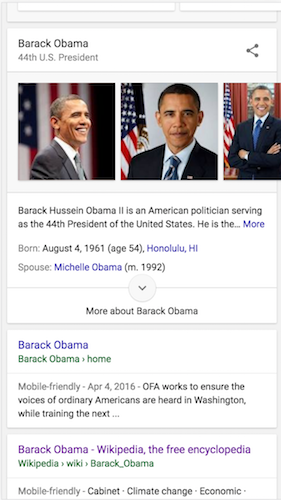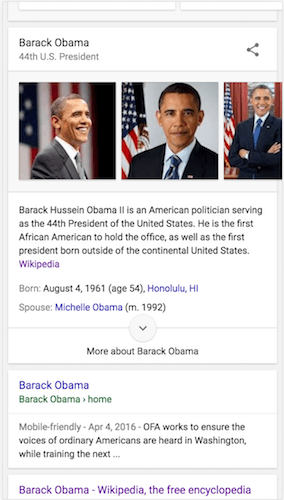
During major news events like the Oscars or the Super Bowl, there’s a good chance you’re going to pull out your phone to look up what else that actor was in, or a little more detail about the person who just won the award for most valuable player.
If you use Google as your search engine, you’ll notice some changes on how Wikipedia content is showcased in Google mobile web searches. It’s now easier to see more information directly from Wikipedia in Google search results and know that it came from Wikipedia. It’s also now easier for people to click through to Wikipedia to learn more about topics that interest them.
We realize some Wikipedia users prefer to use other search engines, including open-source alternatives. However, Google remains a major access point for information and for Wikipedia, which is accessed from mobile devices more than 200 million times every day. On average, about a third of daily pageviews to Wikimedia sites come from users searching Google. Since May 2012, content from Wikipedia has been displayed alongside Google’s search engine results, as part of the “knowledge panel”—though it hasn’t always been the easiest to see that the material came from Wikipedia while on mobile devices.
At the Wikimedia Foundation, we’ve been working to change that. In collaboration with the Foundation’s Strategic Partnerships and Product teams, the Google Search team improved how Wikipedia results look in Google’s mobile web searches. Before, Wikipedia content was truncated into a short snippet, which looked like this:

Readers couldn’t easily tell that content at the top of Google search results originated from Wikipedia, and they couldn’t easily click through to Wikipedia to learn more about a particular subject.
Now, if you search for a subject contained on Wikipedia on Google, it looks like this:

Wikipedia content surfaced on Google search results is now expanded by default, which makes it easier to see more content from Wikimedia at first glance. We also made it easier for readers to click through to Wikipedia to learn more about the topic they searched for on Google. A link to Wikipedia is now automatically provided after the first paragraph of text, which both attributes the material to Wikipedia and makes it easier for readers to click through to Wikipedia to continue learning more about the topic they’ve searched for.
Some who have watched Wikipedia’s evolving presence within Google search results cheered the breakthrough. “Our goal is to make the sum of all knowledge accessible to every person on the planet,” says German Wikipedia editor and Wikimedia Deutschland volunteer Lukas Mezger. “If for-profit entities like Google work with us on this mission, we’re thankful for that.”
We’re continually looking for ways to improve how people access the free knowledge volunteers contribute to Wikimedia projects. Improving the touch-points where people may encounter Wikipedia content—such as in search engine results—helps ensure that people can access free knowledge wherever they happen to encounter it. We look forward to continuing our work with Google and other partners in this quest to ensure every single human being can freely share in the sum of all knowledge.
Sheree Chang, Vice President of Strategic Partnerships
Wikimedia Foundation

Can you help us translate this article?
In order for this article to reach as many people as possible we would like your help. Can you translate this article to get the message out?
Start translation